Automated Facial Recognition Authentication: Analysis and Implications
VerifiedAdded on 2022/10/17
|14
|3648
|446
Report
AI Summary
This report analyzes the implementation of an Automated Facial Recognition Authentication (AFRA) system by a state government for enhancing user authentication in state-level services, particularly for licence applications and renewals. The report explores the potential benefits, such as preventing fraudulent activities like multiple licences, while also addressing significant problems, including privacy concerns related to data storage, potential hacking, and misuse. The implications for individual privacy are examined, highlighting the lack of transparency in algorithms, the risk of bias and discrimination, and the potential for misuse of personal data. Ethical considerations are also discussed, focusing on errors in the system, function creep, and the collection of data without individual knowledge, alongside privacy concerns. The report assesses the ethical and privacy implications of the state police's proposed use of AFRA, providing a comprehensive overview of the technology's impact on society and individual rights.
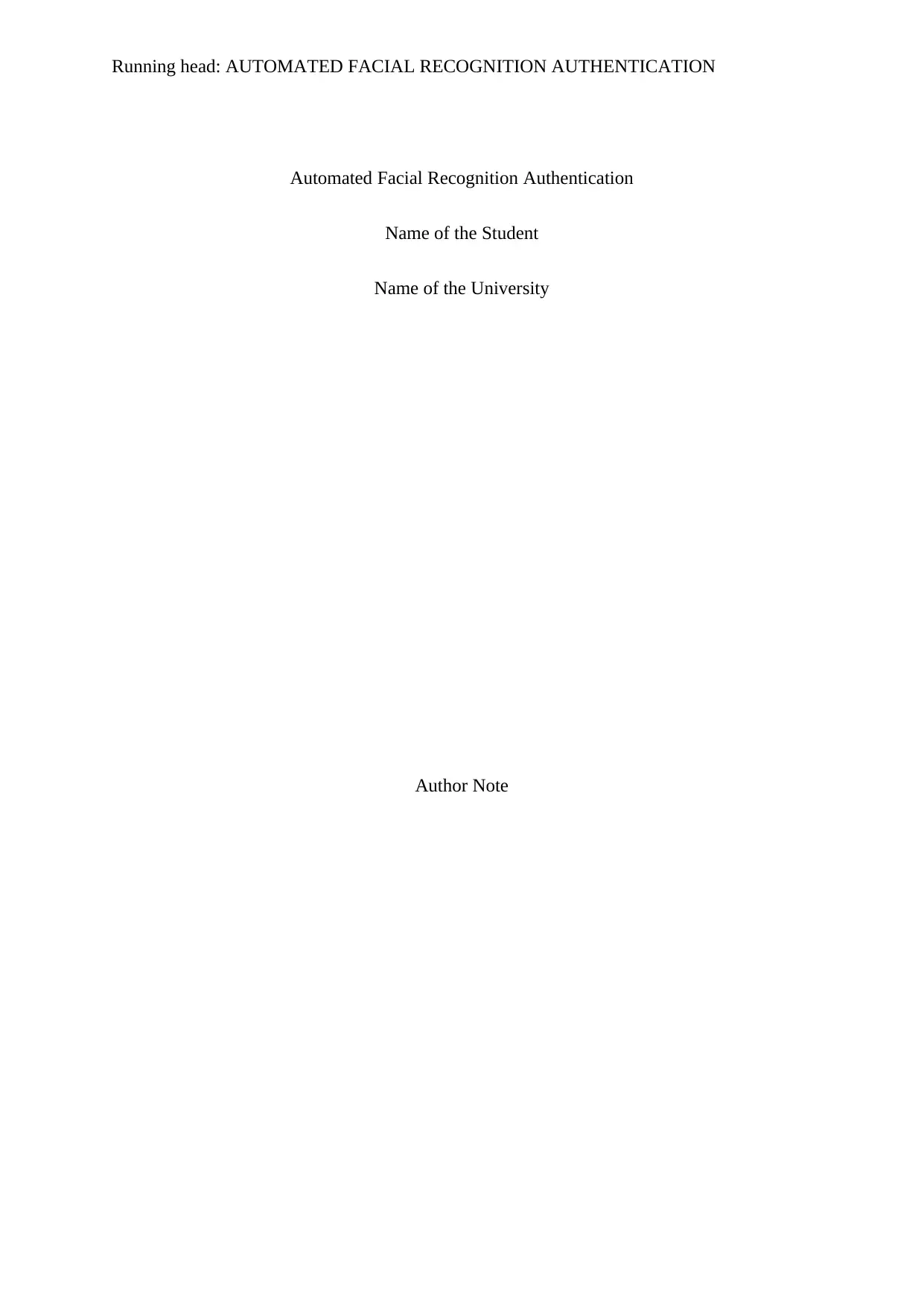
Running head: AUTOMATED FACIAL RECOGNITION AUTHENTICATION
Automated Facial Recognition Authentication
Name of the Student
Name of the University
Author Note
Automated Facial Recognition Authentication
Name of the Student
Name of the University
Author Note
Paraphrase This Document
Need a fresh take? Get an instant paraphrase of this document with our AI Paraphraser
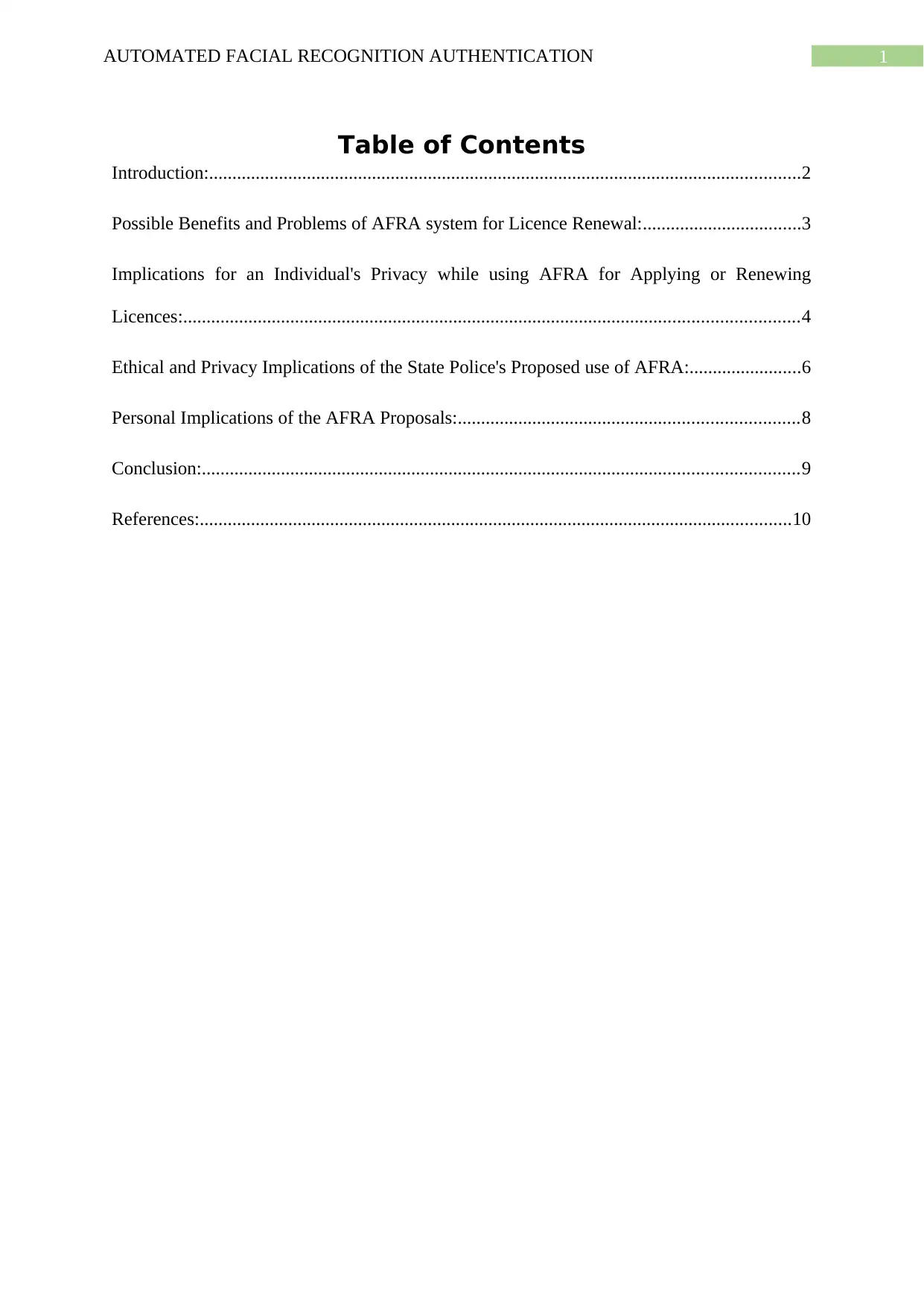
1AUTOMATED FACIAL RECOGNITION AUTHENTICATION
Table of Contents
Introduction:...............................................................................................................................2
Possible Benefits and Problems of AFRA system for Licence Renewal:..................................3
Implications for an Individual's Privacy while using AFRA for Applying or Renewing
Licences:....................................................................................................................................4
Ethical and Privacy Implications of the State Police's Proposed use of AFRA:........................6
Personal Implications of the AFRA Proposals:.........................................................................8
Conclusion:................................................................................................................................9
References:...............................................................................................................................10
Table of Contents
Introduction:...............................................................................................................................2
Possible Benefits and Problems of AFRA system for Licence Renewal:..................................3
Implications for an Individual's Privacy while using AFRA for Applying or Renewing
Licences:....................................................................................................................................4
Ethical and Privacy Implications of the State Police's Proposed use of AFRA:........................6
Personal Implications of the AFRA Proposals:.........................................................................8
Conclusion:................................................................................................................................9
References:...............................................................................................................................10
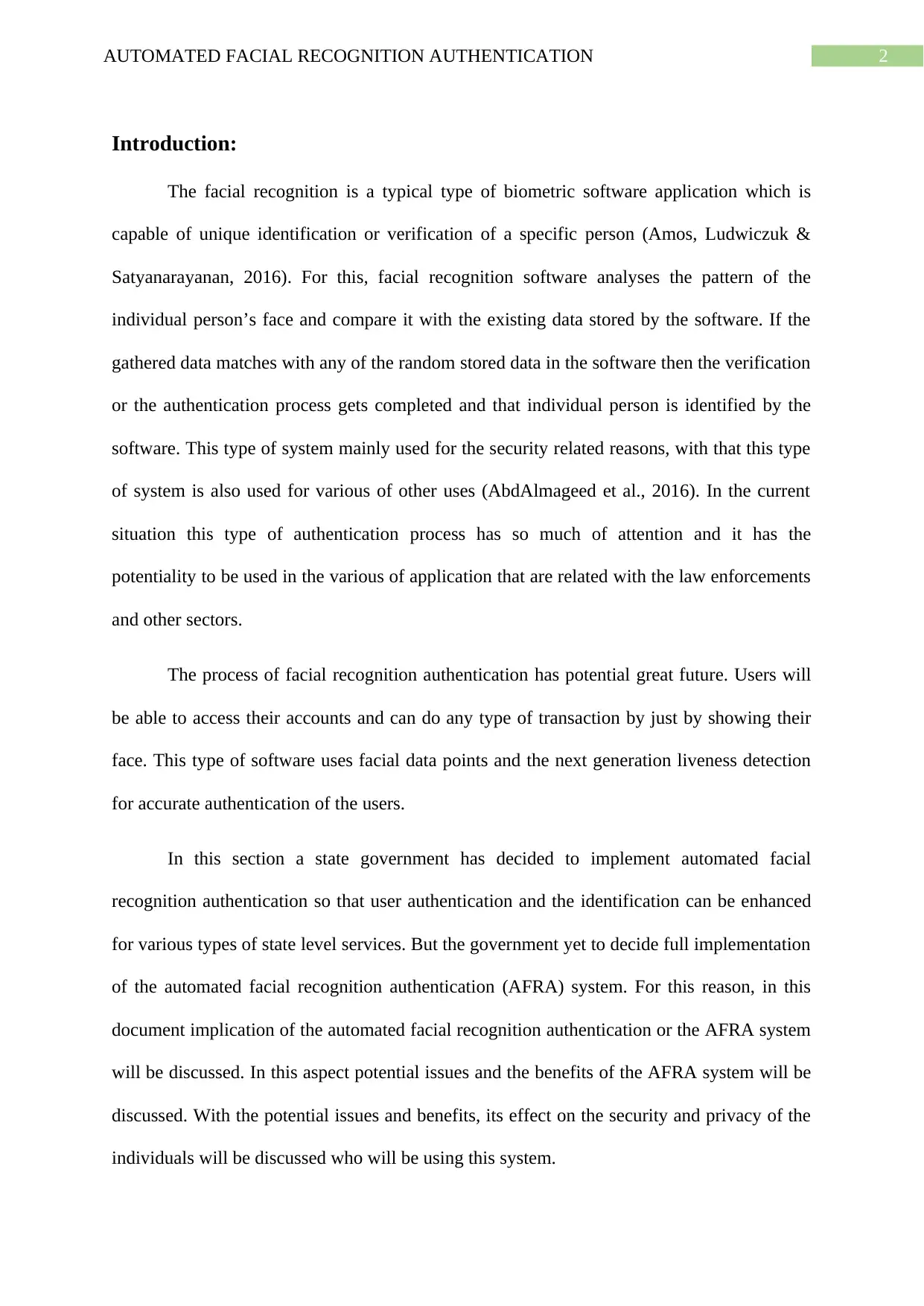
2AUTOMATED FACIAL RECOGNITION AUTHENTICATION
Introduction:
The facial recognition is a typical type of biometric software application which is
capable of unique identification or verification of a specific person (Amos, Ludwiczuk &
Satyanarayanan, 2016). For this, facial recognition software analyses the pattern of the
individual person’s face and compare it with the existing data stored by the software. If the
gathered data matches with any of the random stored data in the software then the verification
or the authentication process gets completed and that individual person is identified by the
software. This type of system mainly used for the security related reasons, with that this type
of system is also used for various of other uses (AbdAlmageed et al., 2016). In the current
situation this type of authentication process has so much of attention and it has the
potentiality to be used in the various of application that are related with the law enforcements
and other sectors.
The process of facial recognition authentication has potential great future. Users will
be able to access their accounts and can do any type of transaction by just by showing their
face. This type of software uses facial data points and the next generation liveness detection
for accurate authentication of the users.
In this section a state government has decided to implement automated facial
recognition authentication so that user authentication and the identification can be enhanced
for various types of state level services. But the government yet to decide full implementation
of the automated facial recognition authentication (AFRA) system. For this reason, in this
document implication of the automated facial recognition authentication or the AFRA system
will be discussed. In this aspect potential issues and the benefits of the AFRA system will be
discussed. With the potential issues and benefits, its effect on the security and privacy of the
individuals will be discussed who will be using this system.
Introduction:
The facial recognition is a typical type of biometric software application which is
capable of unique identification or verification of a specific person (Amos, Ludwiczuk &
Satyanarayanan, 2016). For this, facial recognition software analyses the pattern of the
individual person’s face and compare it with the existing data stored by the software. If the
gathered data matches with any of the random stored data in the software then the verification
or the authentication process gets completed and that individual person is identified by the
software. This type of system mainly used for the security related reasons, with that this type
of system is also used for various of other uses (AbdAlmageed et al., 2016). In the current
situation this type of authentication process has so much of attention and it has the
potentiality to be used in the various of application that are related with the law enforcements
and other sectors.
The process of facial recognition authentication has potential great future. Users will
be able to access their accounts and can do any type of transaction by just by showing their
face. This type of software uses facial data points and the next generation liveness detection
for accurate authentication of the users.
In this section a state government has decided to implement automated facial
recognition authentication so that user authentication and the identification can be enhanced
for various types of state level services. But the government yet to decide full implementation
of the automated facial recognition authentication (AFRA) system. For this reason, in this
document implication of the automated facial recognition authentication or the AFRA system
will be discussed. In this aspect potential issues and the benefits of the AFRA system will be
discussed. With the potential issues and benefits, its effect on the security and privacy of the
individuals will be discussed who will be using this system.
⊘ This is a preview!⊘
Do you want full access?
Subscribe today to unlock all pages.

Trusted by 1+ million students worldwide
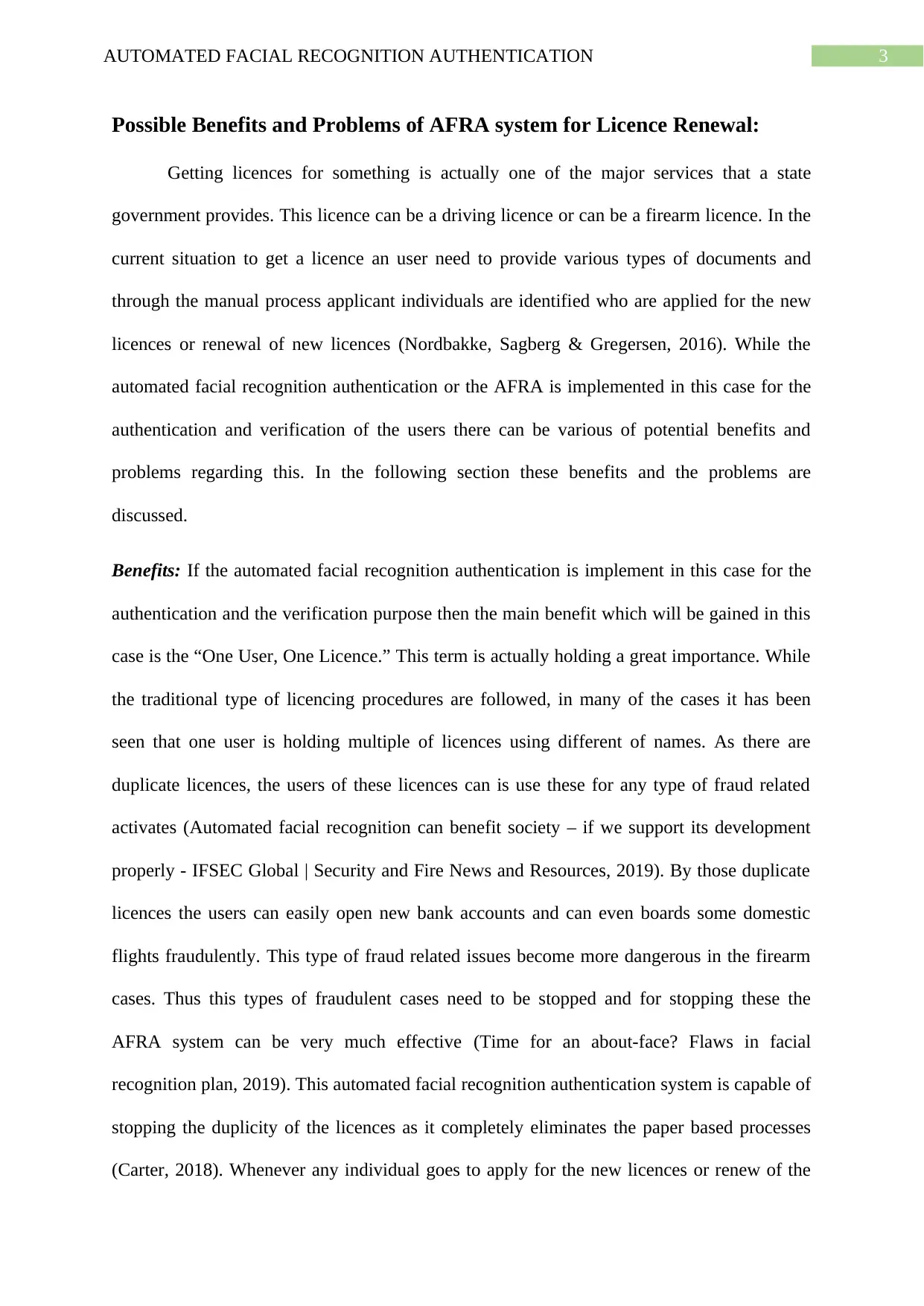
3AUTOMATED FACIAL RECOGNITION AUTHENTICATION
Possible Benefits and Problems of AFRA system for Licence Renewal:
Getting licences for something is actually one of the major services that a state
government provides. This licence can be a driving licence or can be a firearm licence. In the
current situation to get a licence an user need to provide various types of documents and
through the manual process applicant individuals are identified who are applied for the new
licences or renewal of new licences (Nordbakke, Sagberg & Gregersen, 2016). While the
automated facial recognition authentication or the AFRA is implemented in this case for the
authentication and verification of the users there can be various of potential benefits and
problems regarding this. In the following section these benefits and the problems are
discussed.
Benefits: If the automated facial recognition authentication is implement in this case for the
authentication and the verification purpose then the main benefit which will be gained in this
case is the “One User, One Licence.” This term is actually holding a great importance. While
the traditional type of licencing procedures are followed, in many of the cases it has been
seen that one user is holding multiple of licences using different of names. As there are
duplicate licences, the users of these licences can is use these for any type of fraud related
activates (Automated facial recognition can benefit society – if we support its development
properly - IFSEC Global | Security and Fire News and Resources, 2019). By those duplicate
licences the users can easily open new bank accounts and can even boards some domestic
flights fraudulently. This type of fraud related issues become more dangerous in the firearm
cases. Thus this types of fraudulent cases need to be stopped and for stopping these the
AFRA system can be very much effective (Time for an about-face? Flaws in facial
recognition plan, 2019). This automated facial recognition authentication system is capable of
stopping the duplicity of the licences as it completely eliminates the paper based processes
(Carter, 2018). Whenever any individual goes to apply for the new licences or renew of the
Possible Benefits and Problems of AFRA system for Licence Renewal:
Getting licences for something is actually one of the major services that a state
government provides. This licence can be a driving licence or can be a firearm licence. In the
current situation to get a licence an user need to provide various types of documents and
through the manual process applicant individuals are identified who are applied for the new
licences or renewal of new licences (Nordbakke, Sagberg & Gregersen, 2016). While the
automated facial recognition authentication or the AFRA is implemented in this case for the
authentication and verification of the users there can be various of potential benefits and
problems regarding this. In the following section these benefits and the problems are
discussed.
Benefits: If the automated facial recognition authentication is implement in this case for the
authentication and the verification purpose then the main benefit which will be gained in this
case is the “One User, One Licence.” This term is actually holding a great importance. While
the traditional type of licencing procedures are followed, in many of the cases it has been
seen that one user is holding multiple of licences using different of names. As there are
duplicate licences, the users of these licences can is use these for any type of fraud related
activates (Automated facial recognition can benefit society – if we support its development
properly - IFSEC Global | Security and Fire News and Resources, 2019). By those duplicate
licences the users can easily open new bank accounts and can even boards some domestic
flights fraudulently. This type of fraud related issues become more dangerous in the firearm
cases. Thus this types of fraudulent cases need to be stopped and for stopping these the
AFRA system can be very much effective (Time for an about-face? Flaws in facial
recognition plan, 2019). This automated facial recognition authentication system is capable of
stopping the duplicity of the licences as it completely eliminates the paper based processes
(Carter, 2018). Whenever any individual goes to apply for the new licences or renew of the
Paraphrase This Document
Need a fresh take? Get an instant paraphrase of this document with our AI Paraphraser
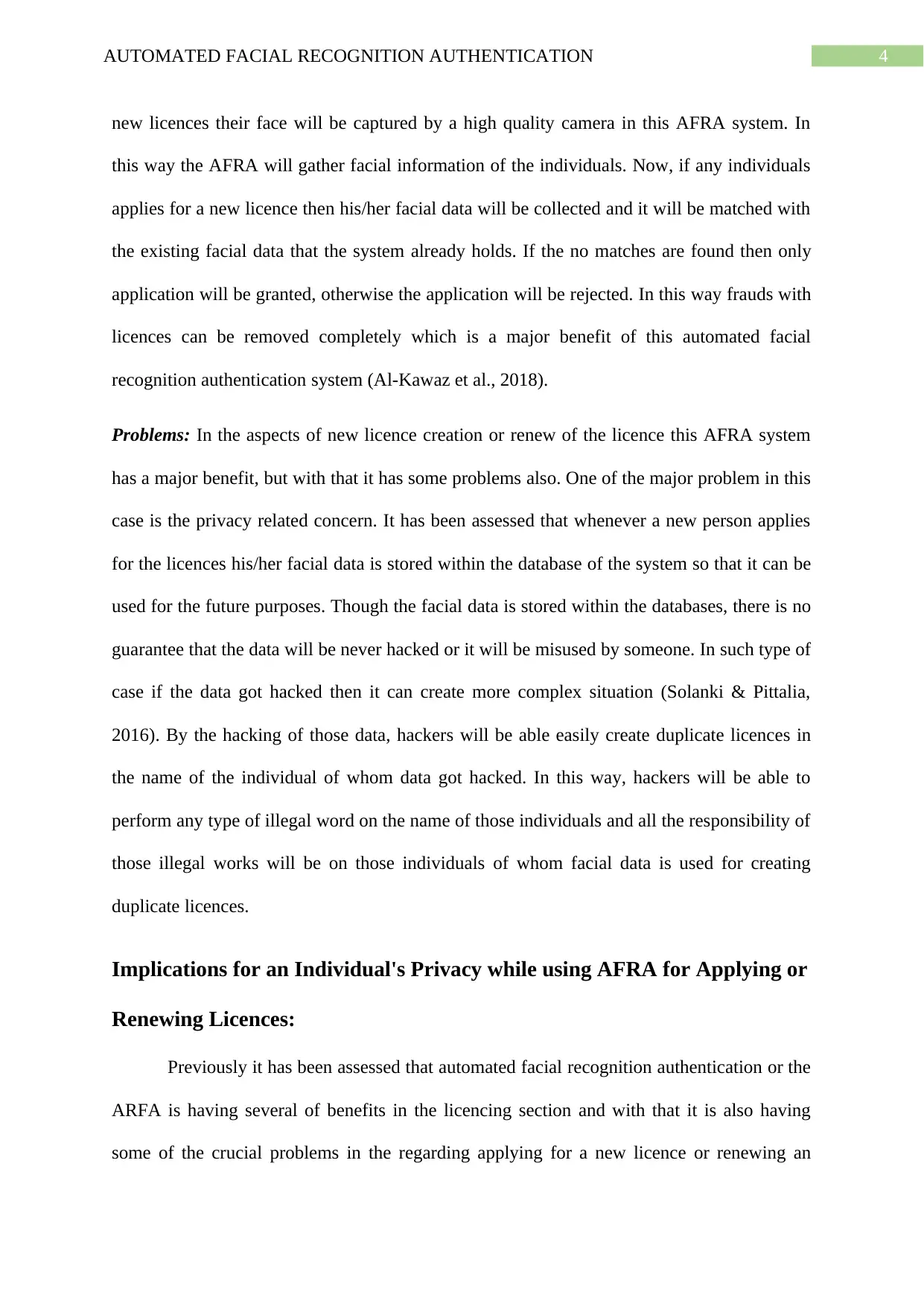
4AUTOMATED FACIAL RECOGNITION AUTHENTICATION
new licences their face will be captured by a high quality camera in this AFRA system. In
this way the AFRA will gather facial information of the individuals. Now, if any individuals
applies for a new licence then his/her facial data will be collected and it will be matched with
the existing facial data that the system already holds. If the no matches are found then only
application will be granted, otherwise the application will be rejected. In this way frauds with
licences can be removed completely which is a major benefit of this automated facial
recognition authentication system (Al-Kawaz et al., 2018).
Problems: In the aspects of new licence creation or renew of the licence this AFRA system
has a major benefit, but with that it has some problems also. One of the major problem in this
case is the privacy related concern. It has been assessed that whenever a new person applies
for the licences his/her facial data is stored within the database of the system so that it can be
used for the future purposes. Though the facial data is stored within the databases, there is no
guarantee that the data will be never hacked or it will be misused by someone. In such type of
case if the data got hacked then it can create more complex situation (Solanki & Pittalia,
2016). By the hacking of those data, hackers will be able easily create duplicate licences in
the name of the individual of whom data got hacked. In this way, hackers will be able to
perform any type of illegal word on the name of those individuals and all the responsibility of
those illegal works will be on those individuals of whom facial data is used for creating
duplicate licences.
Implications for an Individual's Privacy while using AFRA for Applying or
Renewing Licences:
Previously it has been assessed that automated facial recognition authentication or the
ARFA is having several of benefits in the licencing section and with that it is also having
some of the crucial problems in the regarding applying for a new licence or renewing an
new licences their face will be captured by a high quality camera in this AFRA system. In
this way the AFRA will gather facial information of the individuals. Now, if any individuals
applies for a new licence then his/her facial data will be collected and it will be matched with
the existing facial data that the system already holds. If the no matches are found then only
application will be granted, otherwise the application will be rejected. In this way frauds with
licences can be removed completely which is a major benefit of this automated facial
recognition authentication system (Al-Kawaz et al., 2018).
Problems: In the aspects of new licence creation or renew of the licence this AFRA system
has a major benefit, but with that it has some problems also. One of the major problem in this
case is the privacy related concern. It has been assessed that whenever a new person applies
for the licences his/her facial data is stored within the database of the system so that it can be
used for the future purposes. Though the facial data is stored within the databases, there is no
guarantee that the data will be never hacked or it will be misused by someone. In such type of
case if the data got hacked then it can create more complex situation (Solanki & Pittalia,
2016). By the hacking of those data, hackers will be able easily create duplicate licences in
the name of the individual of whom data got hacked. In this way, hackers will be able to
perform any type of illegal word on the name of those individuals and all the responsibility of
those illegal works will be on those individuals of whom facial data is used for creating
duplicate licences.
Implications for an Individual's Privacy while using AFRA for Applying or
Renewing Licences:
Previously it has been assessed that automated facial recognition authentication or the
ARFA is having several of benefits in the licencing section and with that it is also having
some of the crucial problems in the regarding applying for a new licence or renewing an
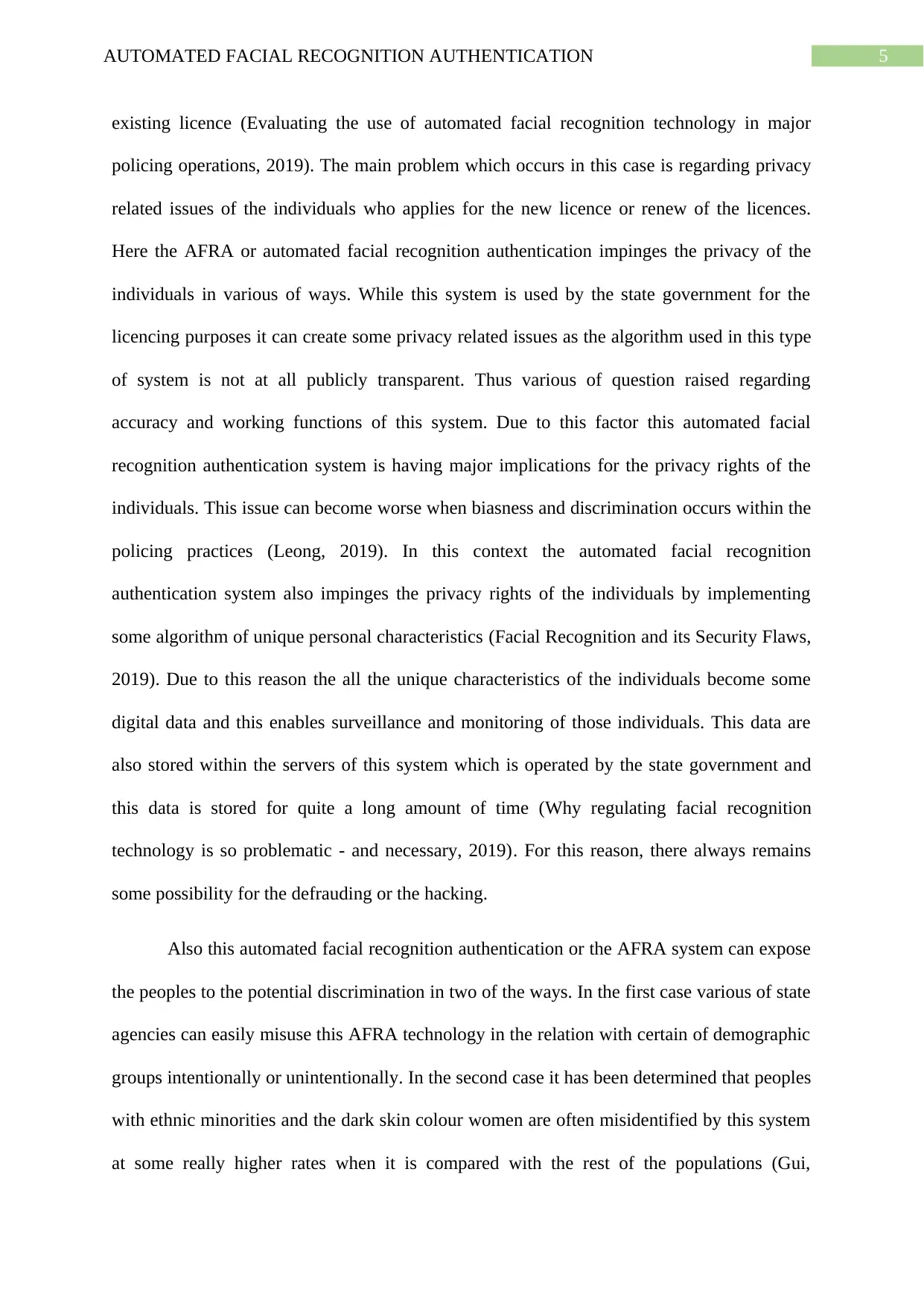
5AUTOMATED FACIAL RECOGNITION AUTHENTICATION
existing licence (Evaluating the use of automated facial recognition technology in major
policing operations, 2019). The main problem which occurs in this case is regarding privacy
related issues of the individuals who applies for the new licence or renew of the licences.
Here the AFRA or automated facial recognition authentication impinges the privacy of the
individuals in various of ways. While this system is used by the state government for the
licencing purposes it can create some privacy related issues as the algorithm used in this type
of system is not at all publicly transparent. Thus various of question raised regarding
accuracy and working functions of this system. Due to this factor this automated facial
recognition authentication system is having major implications for the privacy rights of the
individuals. This issue can become worse when biasness and discrimination occurs within the
policing practices (Leong, 2019). In this context the automated facial recognition
authentication system also impinges the privacy rights of the individuals by implementing
some algorithm of unique personal characteristics (Facial Recognition and its Security Flaws,
2019). Due to this reason the all the unique characteristics of the individuals become some
digital data and this enables surveillance and monitoring of those individuals. This data are
also stored within the servers of this system which is operated by the state government and
this data is stored for quite a long amount of time (Why regulating facial recognition
technology is so problematic - and necessary, 2019). For this reason, there always remains
some possibility for the defrauding or the hacking.
Also this automated facial recognition authentication or the AFRA system can expose
the peoples to the potential discrimination in two of the ways. In the first case various of state
agencies can easily misuse this AFRA technology in the relation with certain of demographic
groups intentionally or unintentionally. In the second case it has been determined that peoples
with ethnic minorities and the dark skin colour women are often misidentified by this system
at some really higher rates when it is compared with the rest of the populations (Gui,
existing licence (Evaluating the use of automated facial recognition technology in major
policing operations, 2019). The main problem which occurs in this case is regarding privacy
related issues of the individuals who applies for the new licence or renew of the licences.
Here the AFRA or automated facial recognition authentication impinges the privacy of the
individuals in various of ways. While this system is used by the state government for the
licencing purposes it can create some privacy related issues as the algorithm used in this type
of system is not at all publicly transparent. Thus various of question raised regarding
accuracy and working functions of this system. Due to this factor this automated facial
recognition authentication system is having major implications for the privacy rights of the
individuals. This issue can become worse when biasness and discrimination occurs within the
policing practices (Leong, 2019). In this context the automated facial recognition
authentication system also impinges the privacy rights of the individuals by implementing
some algorithm of unique personal characteristics (Facial Recognition and its Security Flaws,
2019). Due to this reason the all the unique characteristics of the individuals become some
digital data and this enables surveillance and monitoring of those individuals. This data are
also stored within the servers of this system which is operated by the state government and
this data is stored for quite a long amount of time (Why regulating facial recognition
technology is so problematic - and necessary, 2019). For this reason, there always remains
some possibility for the defrauding or the hacking.
Also this automated facial recognition authentication or the AFRA system can expose
the peoples to the potential discrimination in two of the ways. In the first case various of state
agencies can easily misuse this AFRA technology in the relation with certain of demographic
groups intentionally or unintentionally. In the second case it has been determined that peoples
with ethnic minorities and the dark skin colour women are often misidentified by this system
at some really higher rates when it is compared with the rest of the populations (Gui,
⊘ This is a preview!⊘
Do you want full access?
Subscribe today to unlock all pages.

Trusted by 1+ million students worldwide
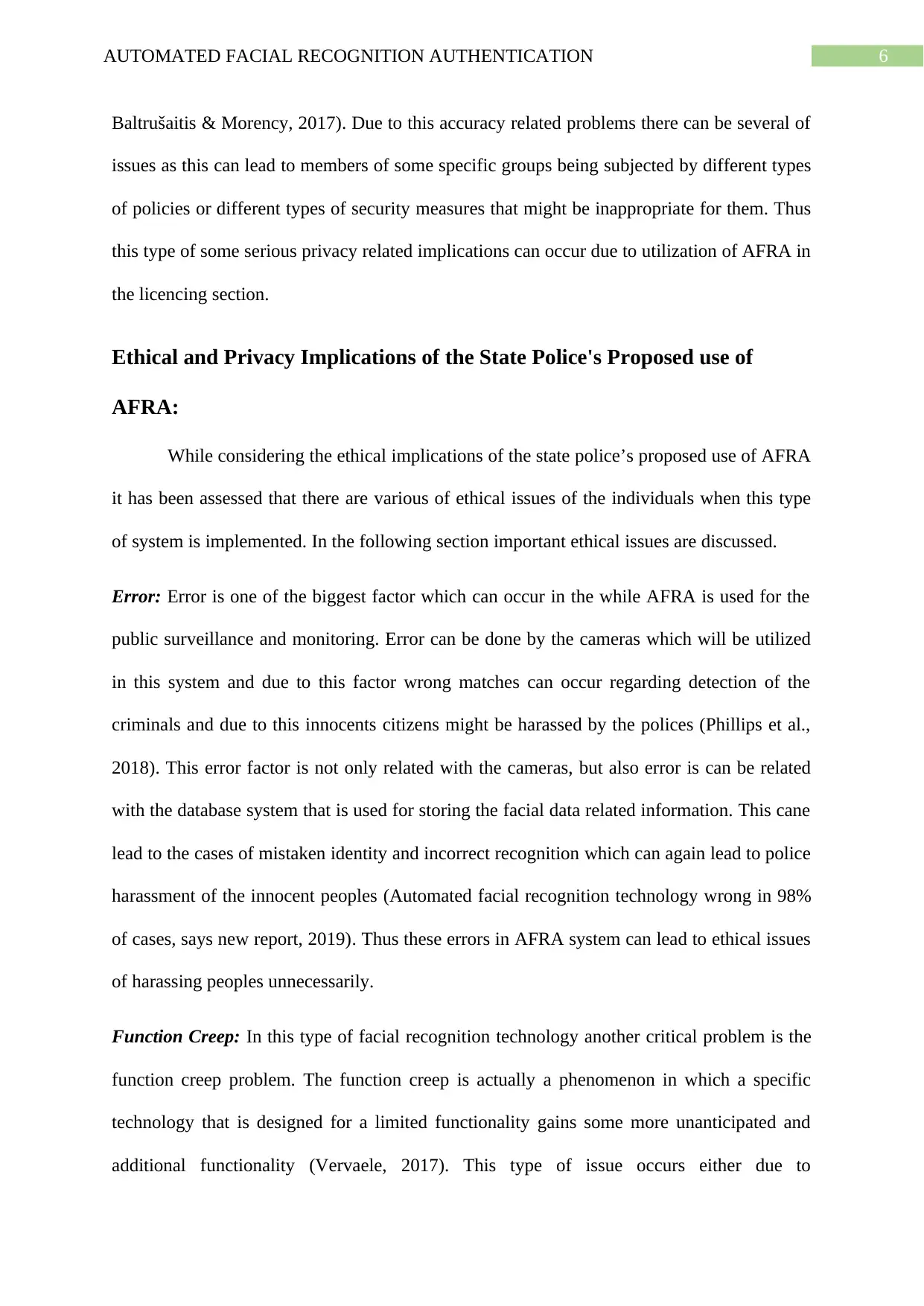
6AUTOMATED FACIAL RECOGNITION AUTHENTICATION
Baltrušaitis & Morency, 2017). Due to this accuracy related problems there can be several of
issues as this can lead to members of some specific groups being subjected by different types
of policies or different types of security measures that might be inappropriate for them. Thus
this type of some serious privacy related implications can occur due to utilization of AFRA in
the licencing section.
Ethical and Privacy Implications of the State Police's Proposed use of
AFRA:
While considering the ethical implications of the state police’s proposed use of AFRA
it has been assessed that there are various of ethical issues of the individuals when this type
of system is implemented. In the following section important ethical issues are discussed.
Error: Error is one of the biggest factor which can occur in the while AFRA is used for the
public surveillance and monitoring. Error can be done by the cameras which will be utilized
in this system and due to this factor wrong matches can occur regarding detection of the
criminals and due to this innocents citizens might be harassed by the polices (Phillips et al.,
2018). This error factor is not only related with the cameras, but also error is can be related
with the database system that is used for storing the facial data related information. This cane
lead to the cases of mistaken identity and incorrect recognition which can again lead to police
harassment of the innocent peoples (Automated facial recognition technology wrong in 98%
of cases, says new report, 2019). Thus these errors in AFRA system can lead to ethical issues
of harassing peoples unnecessarily.
Function Creep: In this type of facial recognition technology another critical problem is the
function creep problem. The function creep is actually a phenomenon in which a specific
technology that is designed for a limited functionality gains some more unanticipated and
additional functionality (Vervaele, 2017). This type of issue occurs either due to
Baltrušaitis & Morency, 2017). Due to this accuracy related problems there can be several of
issues as this can lead to members of some specific groups being subjected by different types
of policies or different types of security measures that might be inappropriate for them. Thus
this type of some serious privacy related implications can occur due to utilization of AFRA in
the licencing section.
Ethical and Privacy Implications of the State Police's Proposed use of
AFRA:
While considering the ethical implications of the state police’s proposed use of AFRA
it has been assessed that there are various of ethical issues of the individuals when this type
of system is implemented. In the following section important ethical issues are discussed.
Error: Error is one of the biggest factor which can occur in the while AFRA is used for the
public surveillance and monitoring. Error can be done by the cameras which will be utilized
in this system and due to this factor wrong matches can occur regarding detection of the
criminals and due to this innocents citizens might be harassed by the polices (Phillips et al.,
2018). This error factor is not only related with the cameras, but also error is can be related
with the database system that is used for storing the facial data related information. This cane
lead to the cases of mistaken identity and incorrect recognition which can again lead to police
harassment of the innocent peoples (Automated facial recognition technology wrong in 98%
of cases, says new report, 2019). Thus these errors in AFRA system can lead to ethical issues
of harassing peoples unnecessarily.
Function Creep: In this type of facial recognition technology another critical problem is the
function creep problem. The function creep is actually a phenomenon in which a specific
technology that is designed for a limited functionality gains some more unanticipated and
additional functionality (Vervaele, 2017). This type of issue occurs either due to
Paraphrase This Document
Need a fresh take? Get an instant paraphrase of this document with our AI Paraphraser
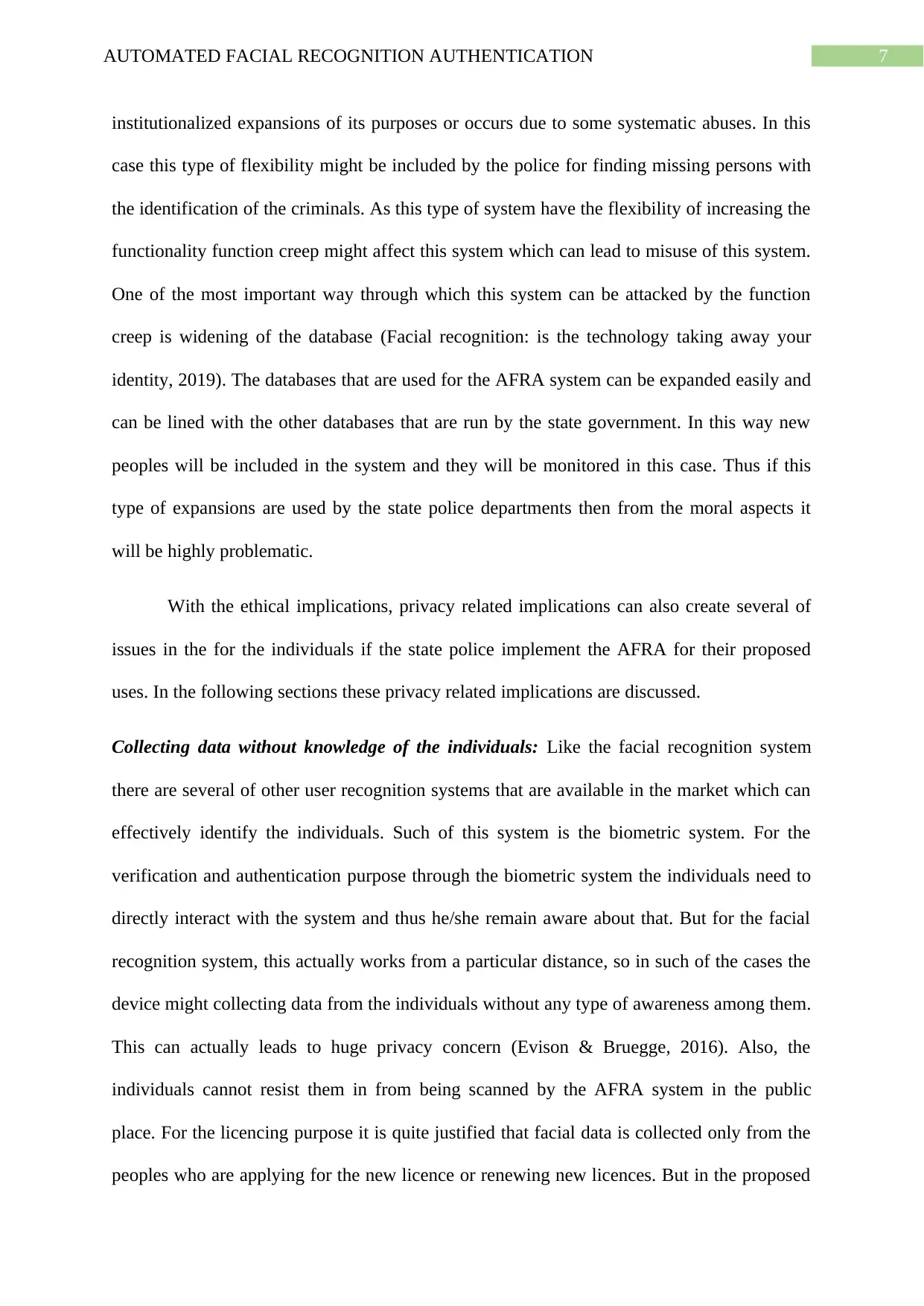
7AUTOMATED FACIAL RECOGNITION AUTHENTICATION
institutionalized expansions of its purposes or occurs due to some systematic abuses. In this
case this type of flexibility might be included by the police for finding missing persons with
the identification of the criminals. As this type of system have the flexibility of increasing the
functionality function creep might affect this system which can lead to misuse of this system.
One of the most important way through which this system can be attacked by the function
creep is widening of the database (Facial recognition: is the technology taking away your
identity, 2019). The databases that are used for the AFRA system can be expanded easily and
can be lined with the other databases that are run by the state government. In this way new
peoples will be included in the system and they will be monitored in this case. Thus if this
type of expansions are used by the state police departments then from the moral aspects it
will be highly problematic.
With the ethical implications, privacy related implications can also create several of
issues in the for the individuals if the state police implement the AFRA for their proposed
uses. In the following sections these privacy related implications are discussed.
Collecting data without knowledge of the individuals: Like the facial recognition system
there are several of other user recognition systems that are available in the market which can
effectively identify the individuals. Such of this system is the biometric system. For the
verification and authentication purpose through the biometric system the individuals need to
directly interact with the system and thus he/she remain aware about that. But for the facial
recognition system, this actually works from a particular distance, so in such of the cases the
device might collecting data from the individuals without any type of awareness among them.
This can actually leads to huge privacy concern (Evison & Bruegge, 2016). Also, the
individuals cannot resist them in from being scanned by the AFRA system in the public
place. For the licencing purpose it is quite justified that facial data is collected only from the
peoples who are applying for the new licence or renewing new licences. But in the proposed
institutionalized expansions of its purposes or occurs due to some systematic abuses. In this
case this type of flexibility might be included by the police for finding missing persons with
the identification of the criminals. As this type of system have the flexibility of increasing the
functionality function creep might affect this system which can lead to misuse of this system.
One of the most important way through which this system can be attacked by the function
creep is widening of the database (Facial recognition: is the technology taking away your
identity, 2019). The databases that are used for the AFRA system can be expanded easily and
can be lined with the other databases that are run by the state government. In this way new
peoples will be included in the system and they will be monitored in this case. Thus if this
type of expansions are used by the state police departments then from the moral aspects it
will be highly problematic.
With the ethical implications, privacy related implications can also create several of
issues in the for the individuals if the state police implement the AFRA for their proposed
uses. In the following sections these privacy related implications are discussed.
Collecting data without knowledge of the individuals: Like the facial recognition system
there are several of other user recognition systems that are available in the market which can
effectively identify the individuals. Such of this system is the biometric system. For the
verification and authentication purpose through the biometric system the individuals need to
directly interact with the system and thus he/she remain aware about that. But for the facial
recognition system, this actually works from a particular distance, so in such of the cases the
device might collecting data from the individuals without any type of awareness among them.
This can actually leads to huge privacy concern (Evison & Bruegge, 2016). Also, the
individuals cannot resist them in from being scanned by the AFRA system in the public
place. For the licencing purpose it is quite justified that facial data is collected only from the
peoples who are applying for the new licence or renewing new licences. But in the proposed
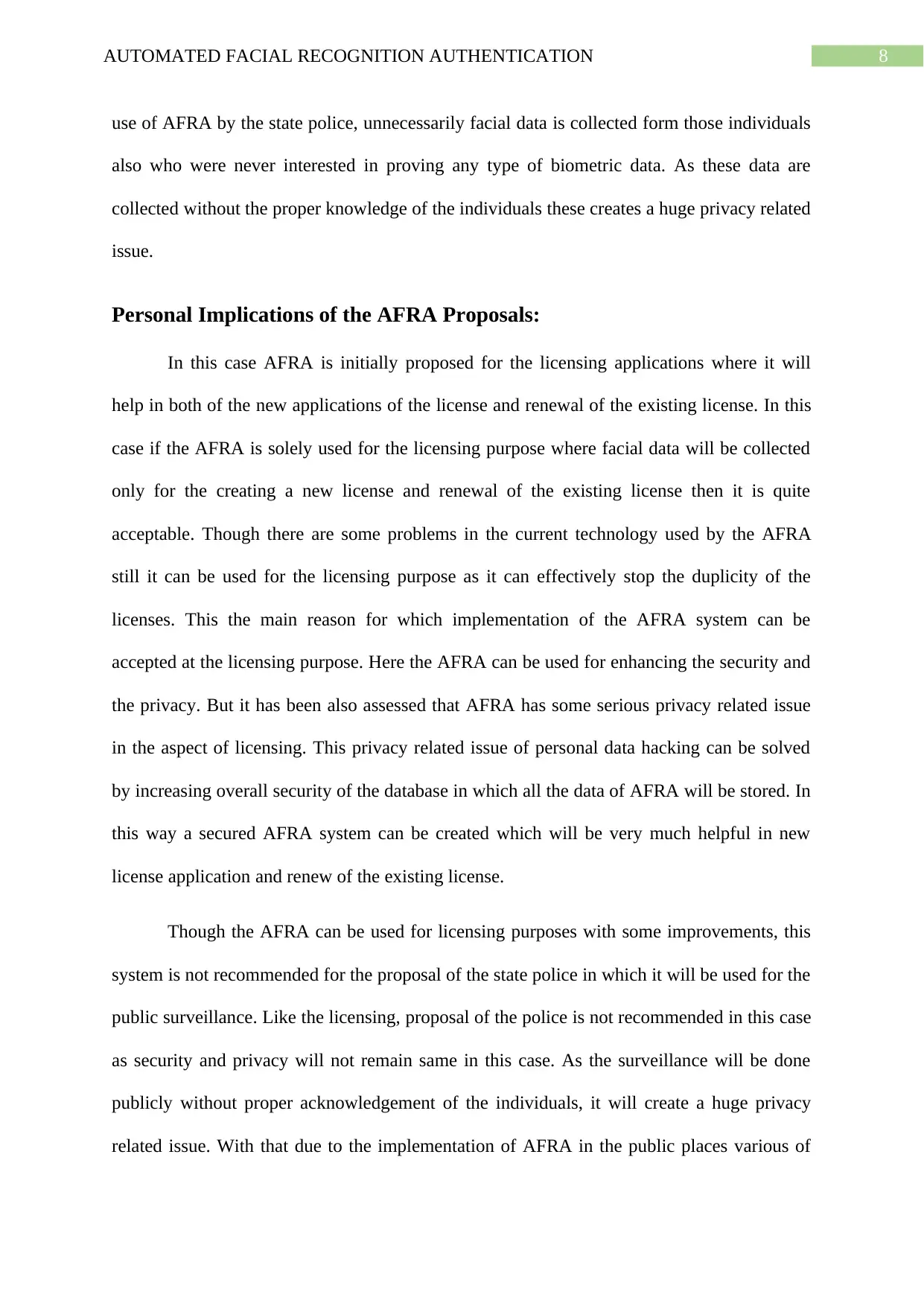
8AUTOMATED FACIAL RECOGNITION AUTHENTICATION
use of AFRA by the state police, unnecessarily facial data is collected form those individuals
also who were never interested in proving any type of biometric data. As these data are
collected without the proper knowledge of the individuals these creates a huge privacy related
issue.
Personal Implications of the AFRA Proposals:
In this case AFRA is initially proposed for the licensing applications where it will
help in both of the new applications of the license and renewal of the existing license. In this
case if the AFRA is solely used for the licensing purpose where facial data will be collected
only for the creating a new license and renewal of the existing license then it is quite
acceptable. Though there are some problems in the current technology used by the AFRA
still it can be used for the licensing purpose as it can effectively stop the duplicity of the
licenses. This the main reason for which implementation of the AFRA system can be
accepted at the licensing purpose. Here the AFRA can be used for enhancing the security and
the privacy. But it has been also assessed that AFRA has some serious privacy related issue
in the aspect of licensing. This privacy related issue of personal data hacking can be solved
by increasing overall security of the database in which all the data of AFRA will be stored. In
this way a secured AFRA system can be created which will be very much helpful in new
license application and renew of the existing license.
Though the AFRA can be used for licensing purposes with some improvements, this
system is not recommended for the proposal of the state police in which it will be used for the
public surveillance. Like the licensing, proposal of the police is not recommended in this case
as security and privacy will not remain same in this case. As the surveillance will be done
publicly without proper acknowledgement of the individuals, it will create a huge privacy
related issue. With that due to the implementation of AFRA in the public places various of
use of AFRA by the state police, unnecessarily facial data is collected form those individuals
also who were never interested in proving any type of biometric data. As these data are
collected without the proper knowledge of the individuals these creates a huge privacy related
issue.
Personal Implications of the AFRA Proposals:
In this case AFRA is initially proposed for the licensing applications where it will
help in both of the new applications of the license and renewal of the existing license. In this
case if the AFRA is solely used for the licensing purpose where facial data will be collected
only for the creating a new license and renewal of the existing license then it is quite
acceptable. Though there are some problems in the current technology used by the AFRA
still it can be used for the licensing purpose as it can effectively stop the duplicity of the
licenses. This the main reason for which implementation of the AFRA system can be
accepted at the licensing purpose. Here the AFRA can be used for enhancing the security and
the privacy. But it has been also assessed that AFRA has some serious privacy related issue
in the aspect of licensing. This privacy related issue of personal data hacking can be solved
by increasing overall security of the database in which all the data of AFRA will be stored. In
this way a secured AFRA system can be created which will be very much helpful in new
license application and renew of the existing license.
Though the AFRA can be used for licensing purposes with some improvements, this
system is not recommended for the proposal of the state police in which it will be used for the
public surveillance. Like the licensing, proposal of the police is not recommended in this case
as security and privacy will not remain same in this case. As the surveillance will be done
publicly without proper acknowledgement of the individuals, it will create a huge privacy
related issue. With that due to the implementation of AFRA in the public places various of
⊘ This is a preview!⊘
Do you want full access?
Subscribe today to unlock all pages.

Trusted by 1+ million students worldwide
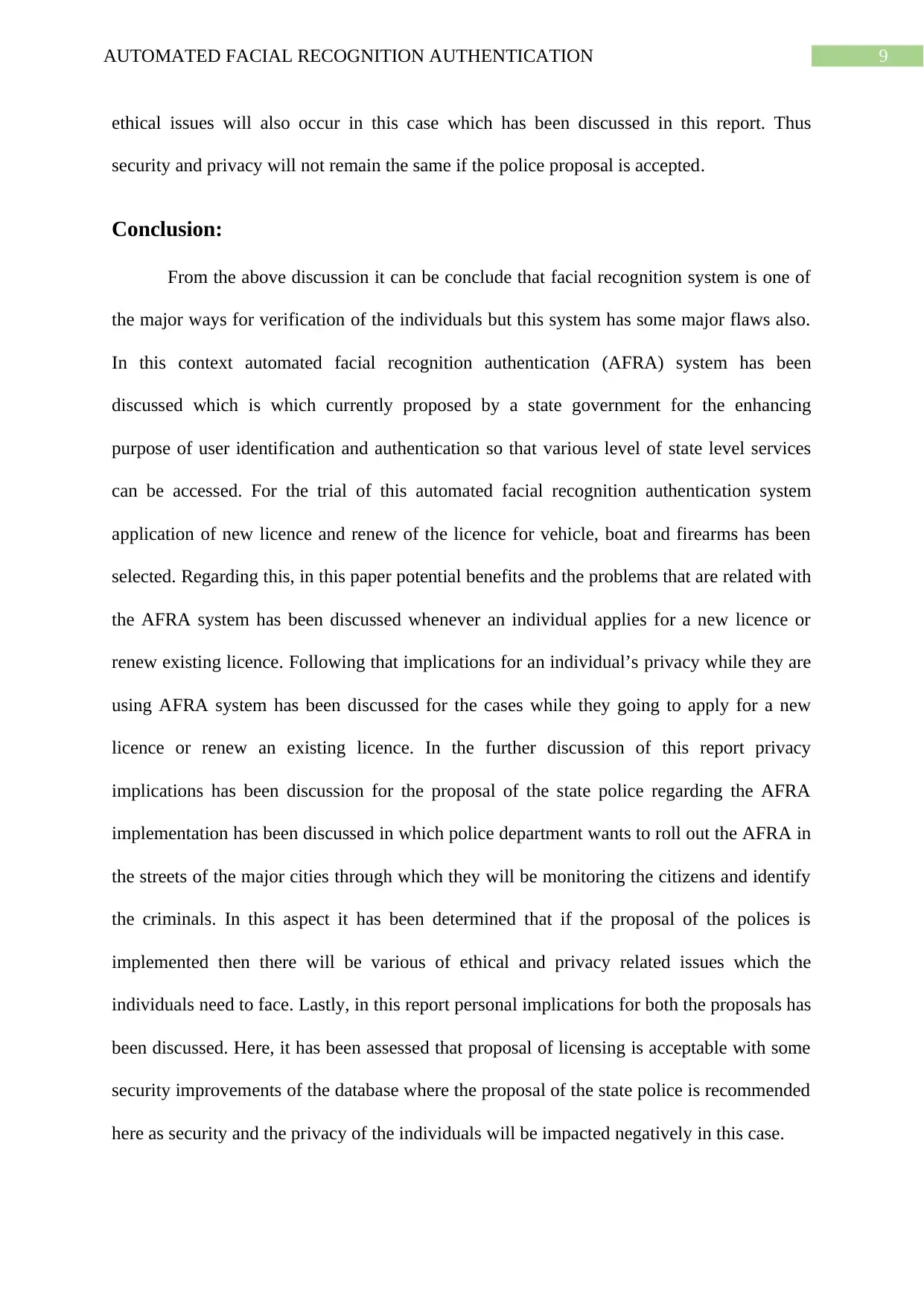
9AUTOMATED FACIAL RECOGNITION AUTHENTICATION
ethical issues will also occur in this case which has been discussed in this report. Thus
security and privacy will not remain the same if the police proposal is accepted.
Conclusion:
From the above discussion it can be conclude that facial recognition system is one of
the major ways for verification of the individuals but this system has some major flaws also.
In this context automated facial recognition authentication (AFRA) system has been
discussed which is which currently proposed by a state government for the enhancing
purpose of user identification and authentication so that various level of state level services
can be accessed. For the trial of this automated facial recognition authentication system
application of new licence and renew of the licence for vehicle, boat and firearms has been
selected. Regarding this, in this paper potential benefits and the problems that are related with
the AFRA system has been discussed whenever an individual applies for a new licence or
renew existing licence. Following that implications for an individual’s privacy while they are
using AFRA system has been discussed for the cases while they going to apply for a new
licence or renew an existing licence. In the further discussion of this report privacy
implications has been discussion for the proposal of the state police regarding the AFRA
implementation has been discussed in which police department wants to roll out the AFRA in
the streets of the major cities through which they will be monitoring the citizens and identify
the criminals. In this aspect it has been determined that if the proposal of the polices is
implemented then there will be various of ethical and privacy related issues which the
individuals need to face. Lastly, in this report personal implications for both the proposals has
been discussed. Here, it has been assessed that proposal of licensing is acceptable with some
security improvements of the database where the proposal of the state police is recommended
here as security and the privacy of the individuals will be impacted negatively in this case.
ethical issues will also occur in this case which has been discussed in this report. Thus
security and privacy will not remain the same if the police proposal is accepted.
Conclusion:
From the above discussion it can be conclude that facial recognition system is one of
the major ways for verification of the individuals but this system has some major flaws also.
In this context automated facial recognition authentication (AFRA) system has been
discussed which is which currently proposed by a state government for the enhancing
purpose of user identification and authentication so that various level of state level services
can be accessed. For the trial of this automated facial recognition authentication system
application of new licence and renew of the licence for vehicle, boat and firearms has been
selected. Regarding this, in this paper potential benefits and the problems that are related with
the AFRA system has been discussed whenever an individual applies for a new licence or
renew existing licence. Following that implications for an individual’s privacy while they are
using AFRA system has been discussed for the cases while they going to apply for a new
licence or renew an existing licence. In the further discussion of this report privacy
implications has been discussion for the proposal of the state police regarding the AFRA
implementation has been discussed in which police department wants to roll out the AFRA in
the streets of the major cities through which they will be monitoring the citizens and identify
the criminals. In this aspect it has been determined that if the proposal of the polices is
implemented then there will be various of ethical and privacy related issues which the
individuals need to face. Lastly, in this report personal implications for both the proposals has
been discussed. Here, it has been assessed that proposal of licensing is acceptable with some
security improvements of the database where the proposal of the state police is recommended
here as security and the privacy of the individuals will be impacted negatively in this case.
Paraphrase This Document
Need a fresh take? Get an instant paraphrase of this document with our AI Paraphraser

10AUTOMATED FACIAL RECOGNITION AUTHENTICATION
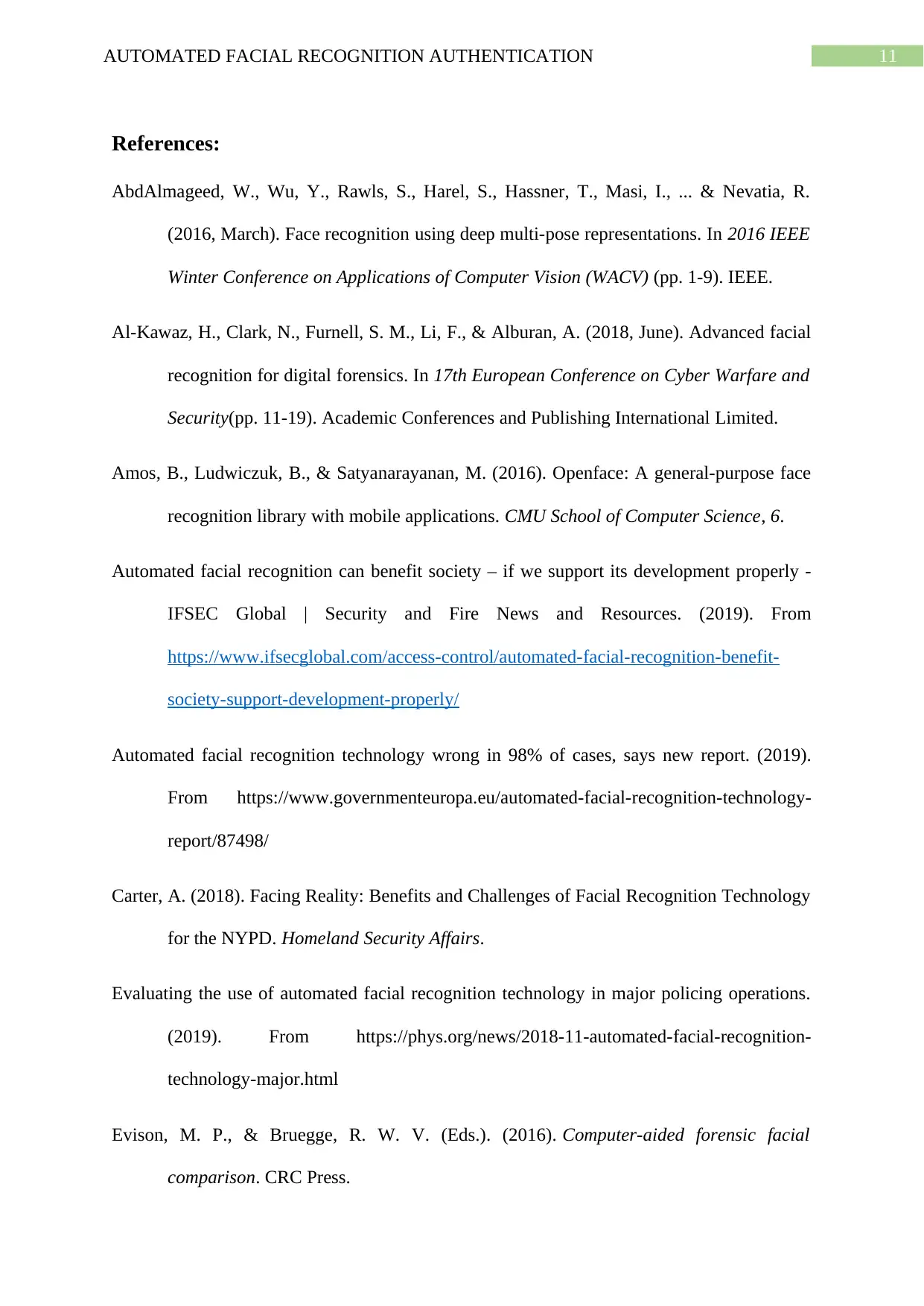
11AUTOMATED FACIAL RECOGNITION AUTHENTICATION
References:
AbdAlmageed, W., Wu, Y., Rawls, S., Harel, S., Hassner, T., Masi, I., ... & Nevatia, R.
(2016, March). Face recognition using deep multi-pose representations. In 2016 IEEE
Winter Conference on Applications of Computer Vision (WACV) (pp. 1-9). IEEE.
Al-Kawaz, H., Clark, N., Furnell, S. M., Li, F., & Alburan, A. (2018, June). Advanced facial
recognition for digital forensics. In 17th European Conference on Cyber Warfare and
Security(pp. 11-19). Academic Conferences and Publishing International Limited.
Amos, B., Ludwiczuk, B., & Satyanarayanan, M. (2016). Openface: A general-purpose face
recognition library with mobile applications. CMU School of Computer Science, 6.
Automated facial recognition can benefit society – if we support its development properly -
IFSEC Global | Security and Fire News and Resources. (2019). From
https://www.ifsecglobal.com/access-control/automated-facial-recognition-benefit-
society-support-development-properly/
Automated facial recognition technology wrong in 98% of cases, says new report. (2019).
From https://www.governmenteuropa.eu/automated-facial-recognition-technology-
report/87498/
Carter, A. (2018). Facing Reality: Benefits and Challenges of Facial Recognition Technology
for the NYPD. Homeland Security Affairs.
Evaluating the use of automated facial recognition technology in major policing operations.
(2019). From https://phys.org/news/2018-11-automated-facial-recognition-
technology-major.html
Evison, M. P., & Bruegge, R. W. V. (Eds.). (2016). Computer-aided forensic facial
comparison. CRC Press.
References:
AbdAlmageed, W., Wu, Y., Rawls, S., Harel, S., Hassner, T., Masi, I., ... & Nevatia, R.
(2016, March). Face recognition using deep multi-pose representations. In 2016 IEEE
Winter Conference on Applications of Computer Vision (WACV) (pp. 1-9). IEEE.
Al-Kawaz, H., Clark, N., Furnell, S. M., Li, F., & Alburan, A. (2018, June). Advanced facial
recognition for digital forensics. In 17th European Conference on Cyber Warfare and
Security(pp. 11-19). Academic Conferences and Publishing International Limited.
Amos, B., Ludwiczuk, B., & Satyanarayanan, M. (2016). Openface: A general-purpose face
recognition library with mobile applications. CMU School of Computer Science, 6.
Automated facial recognition can benefit society – if we support its development properly -
IFSEC Global | Security and Fire News and Resources. (2019). From
https://www.ifsecglobal.com/access-control/automated-facial-recognition-benefit-
society-support-development-properly/
Automated facial recognition technology wrong in 98% of cases, says new report. (2019).
From https://www.governmenteuropa.eu/automated-facial-recognition-technology-
report/87498/
Carter, A. (2018). Facing Reality: Benefits and Challenges of Facial Recognition Technology
for the NYPD. Homeland Security Affairs.
Evaluating the use of automated facial recognition technology in major policing operations.
(2019). From https://phys.org/news/2018-11-automated-facial-recognition-
technology-major.html
Evison, M. P., & Bruegge, R. W. V. (Eds.). (2016). Computer-aided forensic facial
comparison. CRC Press.
⊘ This is a preview!⊘
Do you want full access?
Subscribe today to unlock all pages.

Trusted by 1+ million students worldwide
1 out of 14
Related Documents
Your All-in-One AI-Powered Toolkit for Academic Success.
+13062052269
info@desklib.com
Available 24*7 on WhatsApp / Email
![[object Object]](/_next/static/media/star-bottom.7253800d.svg)
Unlock your academic potential
Copyright © 2020–2026 A2Z Services. All Rights Reserved. Developed and managed by ZUCOL.




